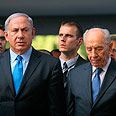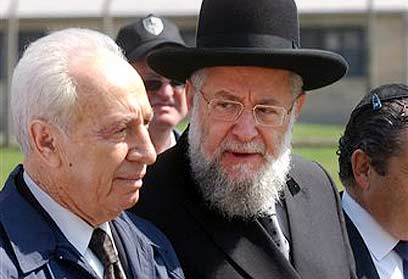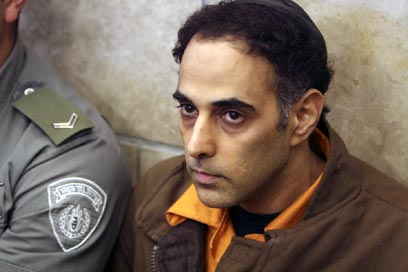
'Israel violent regardless of Rabin murder'
Former chief rabbi, two of Israel leading sociologists believe Israelis would have become more materialistic, greedy and selfish than in November 1995 even without trauma of prime minister's assassination. 'The murder deepened the polarization and hatred between the people,' Rabbi Lau says
According to their estimates and research, Israelis would have become more materialistic, greedy and selfish than on November 4, 1995 in any case, even without the trauma of the murder.
Rabbi Lau explains that the ill atmosphere which led to the murder already existed in Israel in the 1950s, but our heart has become numb. Then, he says, when a Jew murdered a Jew society was shocked. "I still remember the name of the defendant, the judge, the lawyers. It was a horrible trauma."
Since then, things have changed. "I attended a Knesset debate with former Attorney General Elyakim Rubinstein and State Prosecutor Edna Arbel, police officers and members of the State Prosecutor's Office. Three weeks earlier, a woman was murdered on the street, in the middle of the day, by her husband. He stabbed her 26 times. But none of those present could remember he name. They all remembered the details of the 1950 incident, but no one remembered a woman murdered with such cruelty."
'Bullets did not only hit Rabin'
"Even before this murder, a father burned his two daughters, a mother drowned her daughters. There were terrible outbursts of violence," he says.
The murderer's punishment may have deterred people, Rabbi Lau believes, but it also polarized the society. "The murder was denounced, he was sentenced to life in prison and has not been pardoned to this day. But the murder deepened the polarization and hatred between the people, and this is the real pain.
"The three bullets which hit Rabin did not only kill him, but also collapsed the narrow bridge he had tried to build between the different factions of society, even before the Oslo Accords and regardless of the agreements. The murderer's identity deepened the rift, expanded the abyss and brought down the bridge."

Arye Rattner, a professor of sociology and criminology at Haifa University, holds a similar opinion – backed by more than 10 years of research. His studies contradict the atmosphere of reconciliation claimed by Prime Minister Benjamin Netanyahu during the state ceremony in Rabin's memory.
"I think that Rabin's murder sharpened, very clearly, an ideological and religious rift," he says, adding that this is the biggest schism of our time – more than the national split, the Jewish-Arab conflict or the ethnic rift.
Prominent phenomenon in Right
"More than 10 years of research point to a radicalization of negative positions on the part of the haredi population and Judea and Samaria settlers against the law and order system. Stances of non-acceptance, things bordering on de-legitimization of court rulings. This is a perception that religiosity and ideology are above the law."
According to Rattner, this phenomenon can be seen mainly on the right side of the political map. As for the extreme leftists, who don't accept court rulings either, he claims their numbers are much smaller.
"Many things have happened over the past few years, since Rabin's murder. The Amona incidents, for example. Although the disengagement was relatively calm, there we also saw difficult images of a failure to accept the rule of law, defiance against people implementing a government decision. The behavior there borders on violence, although it was restrained, fortunately."
According to Rattner, the Rabin murder was one of the heights of this process, rather than its beginning. "This line in the Israeli society begins as early as the events of the Jewish underground, in the 1980s," he claims.
"These things have roots and are part of a heritage – they don't belong to few individuals. These are margins, and I don't know how narrow they are," he adds.

Unclear how narrow margins are (Archive photo: Hagai Aharon)
Professor Oz Almog from the Department of Land of Israel Studies at Haifa University claims that the radical margins are expanding. "I completely accept the diagnosis that the Israeli society has become morally ugly in the past few years, but I don't think it's because of the murder itself. However, it does contribute to the intolerance and political violence.
"Before the murder, people didn’t dare talk like Yigal Amir and his friends. It was done underground. Today there are thousands who use the same style of talking. These are not necessarily people who will get up and murder, but the hatred is glowing. It's expressed openly."
"It's like when a person commits suicide, it doesn’t just reduce suicidal tendencies but also encourages the phenomenon. You expect a murder to lead to condemnation and the phenomenon to be diminished, but in practice I believe that (Rabin's assassin) Yigal Amir worsened the intolerance and political violence in Israel," Prof. Almog adds. "Today there are people who openly express his opinions and won't stop saying what he says."
Nonetheless, he does not view the murder as the cause of the deterioration, but at the most a factor which had a bigger effect than other incidents. He believes Rabin's murder was indeed a crisis and trauma, but its influence was short range and did not affect processes which would have taken place in any event.
Economic revolution to blame
So who was affected by the murder? The political style in Israel, as well as officials and establishments which were in the center of activity. "Here's one example: Shimon Peres. Before the murder he was the most hated politician in the State of Israel. Today he is the most popular president, who makes everyone grovel. What happened? The shift in his popularity began then, when he took over. He lost the elections after the murder because of the terror attacks, but was perceived as Rabin's follower, the follower of his generation.
"The defense establishment lost, big time. Our sense of insecurity, the citizen's growing lack of trust in the defense establishment definitely had a serious momentum following the murder."
So if the murder itself did not have long-range effects, what caused the moral deterioration in Israel in the past few years? According to Prof. Almog, it was a series of communicational, technological and economic processes.
"Since 1995, extremely accelerated processes have taken place in Israel. These events –not Rabin's murder – created a new order in Israel. The first is the economic revolution, the most to ultra-capitalism and globalization. Israel has turned into a materialistic, greedy, very selfish and hedonist society.
"At the same time, there has been a communicational revolution: Cell phones, television, Channel 2 and internet of course. This creates a new generation of people. The Israeli Y generation."
"Even when the 'candle youth' was at the square, it came there to cry for the experience of it. That youth did not really known Rabin. It's all nonsense spread by the media," Prof. Almog claims.
In addition, he says, "the new dramatic events taking place here erase the previous memory, very fast. The next item came along immediately. The second intifada, the terror attacks, the speed just increases.
"We have gone through so many dramatic events that it's ridiculous to come and ask how this event still affects us. It's a question which was right in the past, when people asked where were you during the State's declaration. Today people just move on."
- Follow Ynetnews on Facebook










